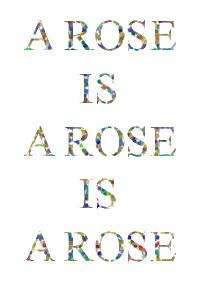 |
I know that at the very least, our foreign names are often hard to pronounce, although in these multi-culti times, people don't seem to mind that about mine (and others') and have some curiosity about its meaning. But in earlier years, many names that did not fit in with the general Scottish, English, Irish or even French were camouflaged or changed. Even Eastern Europeans didn't have it easy.
To give a short example, many early famous Jews and Jewish immigrants changed their names to sound less Jewish. Ira and George Gershwin, lyricists of the early 20th century, were born Israel and Jacob Gershowitz. Irving Berlin was born Israel Isidore Beilin. I'm sure the Jewish Johnny Marks, of "Rudolph, the Red Nosed Reindeer" fame, also changed his name.
These Jewish composers and lyricists had to have gotten their energy and creativity from their name changes. A new name, in a new country, is surely a fresh way to start and to fit in. And I'm sure that with each new lyric, including those memorable Christmas songs, their attachment and indebtedness to their new society grew.
These days, though, the more foreign the name, the better. That is why a writer like Takuan Seiyo, who writes for the Brussels Journal and Vdare amongst other publications, not only advertises his unfamiliar name, but also his convoluted background. We are not quite sure who he is. Where does he fit in: in Japan, in Switzerland, in a US university?
Perhaps it is too harsh to blame Takuan Seiyo for what he does. After all, everyone these days gets to keep his name. And not only that, he is encouraged to keep alive whatever strangeness and foreignness that comes with it.
Here is an excerpt from a piece by Takuan Seiyo at the Intellectual Conservative in April 2007. He is writing about the Virginia Tech murders by a Korean national (and student at the university):
East Asian immigrants, as a group, may be the most valuable human capital imported to the United States, perhaps on a par with the Europeans. Our moral and cerebral lassitude is such that if it weren't for the East Asians, the American pool of people with the IQ and discipline necessary to become an engineer, scientist or physician would decline precipitously.I think it is his unresolved, tangled mental state that makes him write this. But what is wrong with it, you may ask?
Well, firstly, from many empirically sound articles out there, it is clear that the value of “ East Asian” – who exactly are they, Korean, Chinese, Japanese? - immigrant technical workers is their lower wages, and not necessarily their high IQ. Secondly, the lassitude he talks about regarding native American workers is false, since it is government and corporate policies that are providing unfair competition in favor of "East Asian" immigrants, preventing native Americans from working. Finally, there is absolutely no proof that the American pool of qualified people would diminish were it not for the "East Asian" immigrants. What happened for all those centuries in the US and in Europe before these "East Asian" saviors came along?
Now, why bring up Tekuan Seiyo in the first place? Well, for someone who hasn't even resolved his name and thus his place in a (some) society, why should we expect a loyal, or even a clairvoyant explanation of events from him? His mind is after all still with the "East Asians."
His little breach of facts is not a careless mistake, but a state of mind. As a journalist, it is inexcusable that he reports these myths as fact. Rather, it seems that he wants to believe them in order to validate whatever definition he has of himself. And this definition certainly doesn't exclude "East Asian" from his list. His "East Asians" become bigger than life, the saviors of America. Maybe that is the role he wishes for himself.